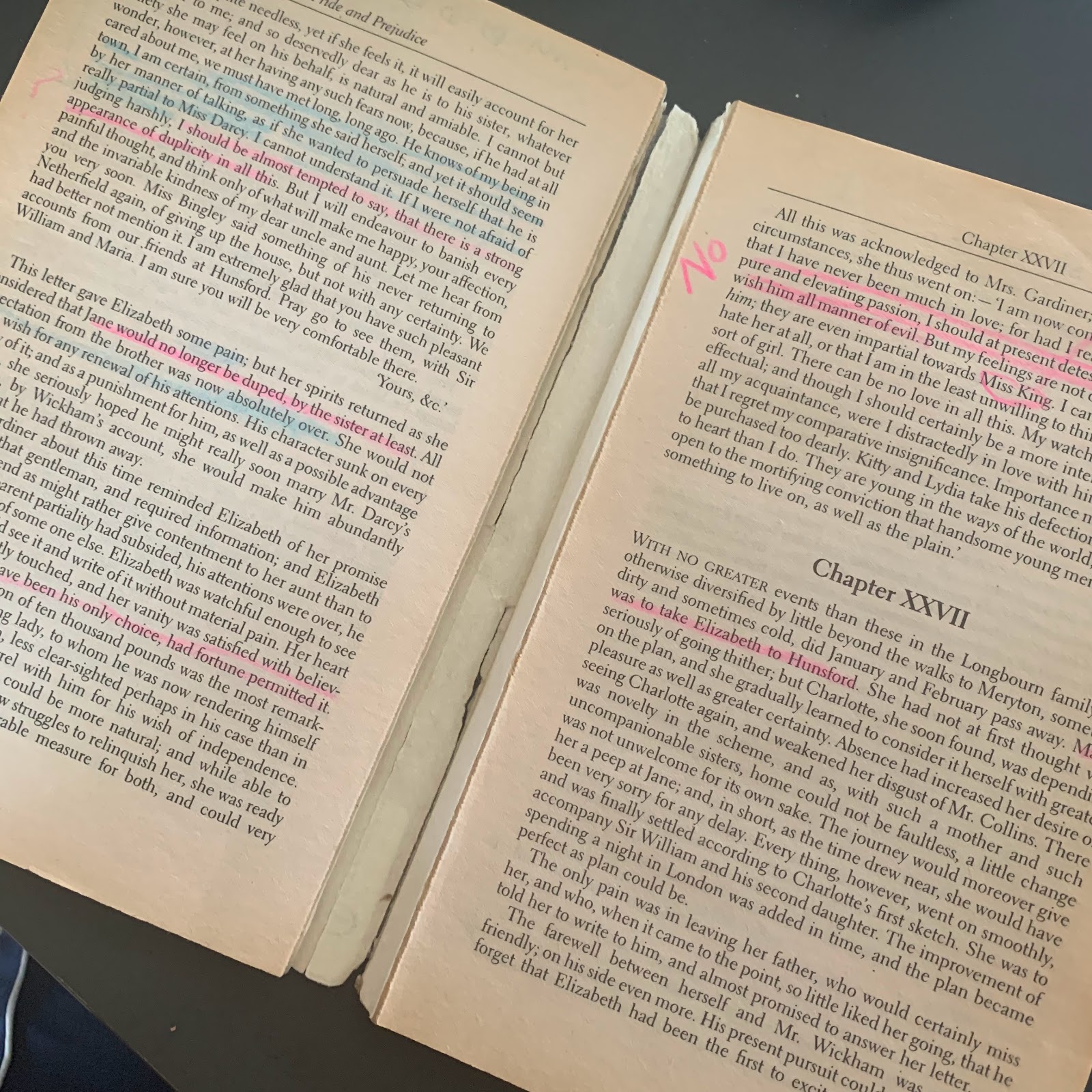Pride and Prejudice
Jane Austen
Published 1813
⭐⭐⭐⭐⭐
I definitely need a new copy of
Pride and Prejudice because mine is falling off its hinges.
I assume that most classical readers have read P&P, and many are familiar with the story. So I do not want to rehash it. Here is my
First Review (2012), which I read for
The Well-Educated Mind novels. I was terrified to read and review it because I had never read Austen before. However, it turned out wonderful and humorous and entertainly smart. Next, I reread without writing a review back in 2018, just for fun.
But this year I desired to reread it for the experience, as I was hoping; but I am learning, as I return to my old reads of years ago, that my first experience with a good book is always the best experience, and I will never have that same experience again.
Of course, rereading is essential to going deeper, exploring, and discovering more -- maybe even making new experiences. I did glean more this third read where I had overlooked previously. I had question marks in the margins regarding certain passages and finally I was able to answer them: "Oh, I get it!"
This time I made new observations, too; for example, how Austen (through Elizabeth) spent so much time loathing Mr. Collins. And when Charlotte "made designs on him" -- that is what I wrote in the margin -- Elizabeth was beside herself for a long time. Charlotte's "unaccountable" marriage to Mr. Collins was truly an offense to Elizabeth. Especially for a woman like Charlotte, who knew much before it happened -- something else in my margin. She was a quick observer of character and foreknew that Jane was likely to discourage Mr. Bingley because she was not showing him enough love...uh, interest. Elizabeth accused Charlotte of not having "a proper way of thinking" because she accepted a most embarrassing and "silly man" like Mr. Collins. Elizabeth went on and on for chapters. I thought it was a little much. Really, Lizzy!
But Jane's wisdom is always ready with a comeback. She assured her sister that she may change her mind when she sees them happy (with each other). I believe eventually that did happen.
Another new idea that stood out to me was how undoubtedly sad Mr. Bennet's absent behavior was in leading his household. He truly was the example of a lazy father and husband -- physically present but emotionally and mentally absent. Actually, he was always in his study (how nice), therefore, he was just as physically absent. How interesting that Austen made that an obvious issue, too, because it tied directly to the poor behavior of Lydia and Kitty. And Mrs. Bennet, too. Men...lead your households!
And lastly, I found a new favorite quote. Jane, in response to Elizabeth's concerns over character (and alluding to Mr. Bingley disinterest in Jane...) said:
We must not be so ready to fancy ourselves intentionally injured. We must not expect a lively young man to be always so guarded and circumspect. It is very often nothing but our own vanity that deceives us. Women fancy admiration means more than it does.
Elizabeth was more upset over Mr. Bingley's disappearance (walking away from Jane) than Jane was of being dropped. Jane let it go. She gave Mr. Bingley the benefit of the doubt and blamed herself for reading too much into his attentions. She was OK. How many of us can handle what feels and looks like rejection as well as Jane?
While I think of Jane as a woman of virtue, maturity, and empathy, I believe Elizabeth shares those qualities also. In addition, Elizabeth is lively (what Mr. Darcy found attractive), feisty, and keen -- and we all cheer for her because of these. However, this time, for me, Jane really stood out. I really appreciated her character even more so. And even though her story is not the main point, it is essential and provides many lessons for readers.



No comments:
Post a Comment
Share your thoughts...